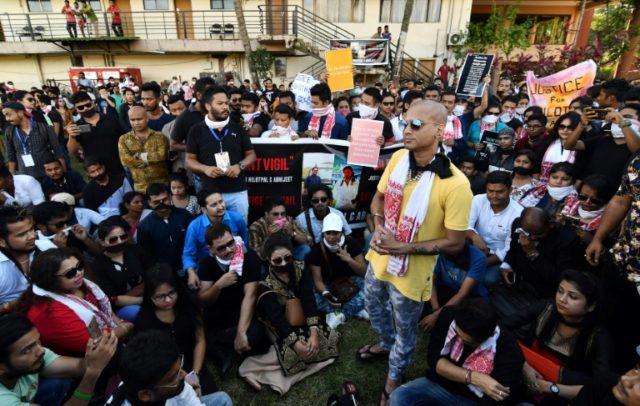Indian police announced on Monday they have conducted 30 arrests for the Friday murder of Mohammed Azam, killed by a frenzied mob after a rumor accusing him of kidnapping children spread on the WhatsApp social media platform.
Azam is described by Deutsche Welle as a “32-year-old Google engineer” who was attacked along with three of his friends on Friday in a remote village in southern India while they “offered imported chocolates to school children.”
A mob angered by rumors spread on WhatsApp confronted Azam’s party, assaulted them, and chased them down when they fled. Varying reports put the size of the mob at anywhere from 50 to 3,000 people; it seems the situation escalated quickly and more attackers joined the fray after Azam’s group tried to flee to another village. At least ten police officers were reportedly injured in a futile effort to control the mob.
CNN quoted an Indian official who said the police are not certain why Azam was handing out candy to schoolgirls or if they had any “bad intentions.” The Sisat Daily said Azam and his party were en route to the city of Bidar when they stopped in the village for tea and decided to give local children some chocolates they had imported from Qatar.
The Times of India reported Azam’s companions were all members of the same Qatari family and they were traveling to Bidar to visit a mutual friend. According to the wife of one victim, the Qatari visitors were unaware of the wave of social-media-driven violence in India and were shocked when some of the children gathered to receive their candy started screaming. In this account, the rumor of child abductions was essentially cooked up on the spot and flashed across WhatsApp to the next village, where a larger and more violent mob assembled to intercept the fleeing men.
Although many reports referred to Azam’s murder as a “lynching,” he was evidently beaten to death. The Times of India reported that several of his friends were severely injured in the attack.
First Post substantially agreed with the TOI account, although it said only one member of Azam’s group was a Qatari national, and he was the one passing out chocolate to the children. The crowd’s suspicions were fueled by the way Qatari chocolate tasted different from the Indian version, leading to suspicions the candy was drugged:
The four men sensed a risk to their life and fled in their vehicle but by then people in the crowd at the school had taken their photographs and videos and circulated them on WhatsApp. The messages, which said a gang of child-lifters had fled from near the school and had to be stopped, were extremely provocative.
The impact was instantaneous. Even as people chased them on motorbikes, villagers blocked the road to Hyderabad. In order to avoid it, Mohammed Azam who was at the wheel and driving at a high speed, swerved, hit a culvert and one of the motorbikes. The vehicle fell into a ditch, after which the mob pulled out the passengers.
Azam, 32, a software engineer with Google and the father of a two-year-old child, was lynched. The injured, after initially being admitted to a district hospital, are now being treated in Hyderabad.
The police have arrested 32 people, including administrators of two WhatsApp groups, who sent out the messages. The phones have been seized and sent for analysis to the cyber crime cell. The police said women were also part of the mob.
First Post added that while some Muslim politicians in India portrayed the attack as an example of Hindu-on-Muslim violence, both the children who received candy and the attackers were a mixture of Hindus and Muslims.
Azam’s brother said in an interview on Monday that when the rumors about child kidnapping spread on WhatsApp, residents of the village Azam was hastily fleeing to organized a roadblock to stop his car, throwing blankets over the windshield to make him crash so they could pull out the passengers and assault them.
As Deutsche Welle noted, assaults driven by social media postings, especially the very popular WhatsApp platform, have become a big problem in India:
Since May, at least 25 people have become victims of vigilante justice triggered by fake warnings of kidnappers or organ harvesters circulated on the Facebook-owned messaging platform WhatsApp.
The perpetrators in most cases are villagers, many of them first-time smartphone users unable to discern between real and fake videos sent via the platform.
An explosion in smartphone use is widely regarded as a major cause of the problem.
Nearly one in three Indians own a smartphone. Last year, 134 million smartphones were sold in India, which is the world’s second-biggest market after China.
The smartphone revolution has changed the way people access information. Political parties, led by Prime Minister Narendra Modi’s Bharatiya Janata Party, are increasingly harnessing the new medium to garner support — in many cases through incendiary content.
India’s Electronics and Information Technology Ministry has asked WhatsApp to remain “accountable, responsible, and vigilant” against incendiary social media postings. WhatsApp management has proclaimed itself “horrified by these terrible acts of violence” and promised to take more precautions against misuse of the service to spread false alarms.

COMMENTS
Please let us know if you're having issues with commenting.